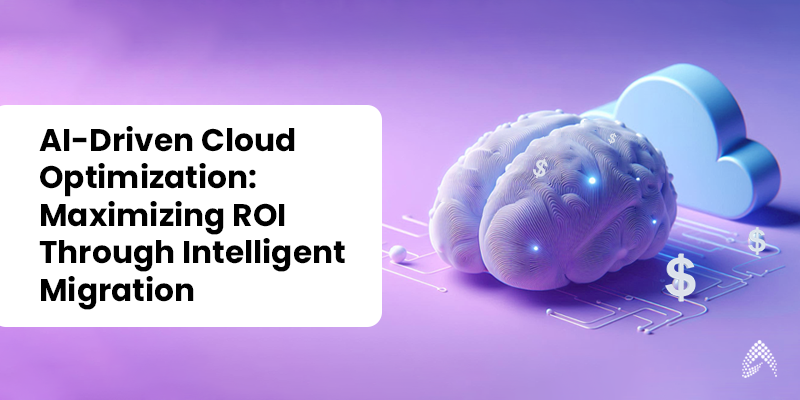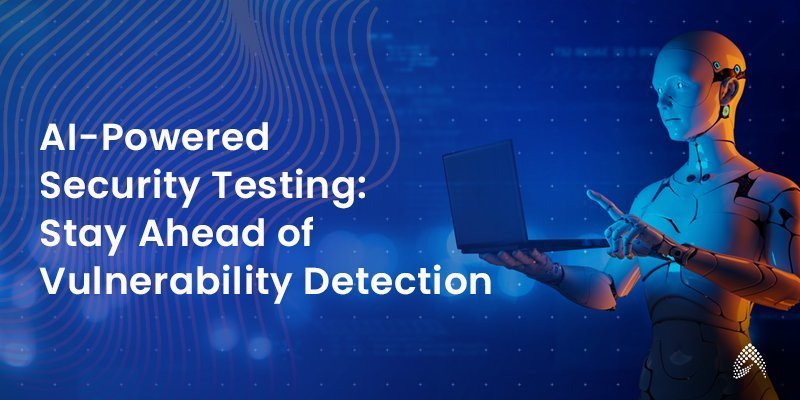Benefits of AI in Cloud Migration and Modernization

The rapid and widespread integration of cloud and automation technologies has sparked a powerful transformation in the business landscape across various industries in recent years.
On average, 70% of businesses have adopted cloud solutions to become agile and scalable and AI to streamline their mundane operations and stay on top of market needs. The synergy of cloud computing and AI has become a new business strategy and is driving businesses to embrace the next transformative wave. [Ref]
Learn more about the top cloud migration strategies for 2024 and beyond.
Are you ready to surf through the magical waves?
This blog will cover how AI integration in cloud computing and platform modernization helps SMBs thrive better than ever.
AI Role in Cloud Migration:
Cloud migration involves transferring applications, data, and other business elements from on-premises infrastructure to cloud-based services. This further helps in achieving scalability, flexibility, and cost-efficiency.
Conversely, platform modernization involves updating and optimizing existing applications, systems, and processes to make them cloud-ready and fully utilize cloud-native features. Technologies like microservices architecture, containerization, serverless computing, and DevOps practices bring agility, scalability, and innovation.
AI in Cloud Computing: The Best Combo For Business Growth and Innovation

1. Autonomous Cloud Management:
Migrating to the cloud is just halfway through your transformation journey. Post-migration, you should be cautious to ensure your resources are well-optimized and utilized. However, traditional cloud management solutions make the process tedious and error-prone, leading to cost overruns or service disruptions.
With AI and cloud integration, your infrastructure can automatically adjust resources based on real-time needs, ensuring optimal performance and cost efficiency.
Example:
The energy and utility industry is transforming significantly, driven by the increasing adoption of renewable energy sources and smart grids, which demand efficient energy delivery. AI-powered autonomous cloud management accurately predicts when a transformer is likely to fail, allowing utilities to schedule maintenance during off-peak hours efficiently.
Also, AI can optimize grid operations by analyzing real-time data from sensors and smart meters. It can identify bottlenecks, optimize power flow, and detect anomalies that could lead to outages.
2. Intelligent Cloud Storage:
Data is the fuel, and it’s crucial to make informed decisions. AI-driven cloud storage systems enhance data storage by optimizing how data is stored, retrieved, and analyzed. These systems use machine learning algorithms to determine the most efficient way to store and access data, reducing latency and speeding up data processing.
AI can also automate data tiering, where frequently accessed data is stored on faster, more expensive storage while less frequently accessed data is moved to slower, cheaper storage. This not only improves performance but also reduces storage costs.
Example:
The healthcare industry generates vast amounts of data, from patient records to medical images. Hence, effectively managing and delivering insights from this data is crucial for improving patient care, reducing costs, and driving innovation. With AI-powered healthcare solutions, healthcare providers can access patient information from anywhere, enabling better collaboration and faster decision-making.
On the other hand, AI-powered analytics and ML algorithms further enhance your capabilities in predicting malicious operations and developing robust data security and compliance management strategies.
Check out your guide to IT-driven process automation in the healthcare industry.
3. Cloud-based AI Services:
AI-as-a-service (AIaaS) is currently booming across industries. Cloud providers offer AIaaS, allowing businesses to build and deploy AI applications without the need to manage the underlying infrastructure.
This modern approach democratizes access to advanced AI tools, making it easier for organizations of all sizes to leverage AI capabilities. Developers can use AIaaS to integrate machine learning models, natural language processing, or computer vision into their applications, accelerating innovation and reducing time-to-market.
Example:
A small retail business can use AIaaS to integrate a recommendation engine into its online store without requiring a large data science team. The cloud provider offers pre-trained models and APIs to analyze customer purchase history and recommend relevant products, enhancing customer satisfaction and driving sales.
4. Cloud Migration and Optimization:
Cloud migration isn’t just about pressing a button and waiting for magic to happen. Cloud migration involves several complex steps, such as data transfer, application reconfiguration, and performance tuning. But with AI, many of these tasks can be automated, saving you time and effort. AI tools can analyze your current infrastructure, find the best cloud setup, and seamlessly migrate your workloads.
Even post-migration, AI works by optimizing your cloud environment, spotting inefficiencies, and suggesting improvements. This is like having a virtual cloud expert working around the cloud to maximize your cloud investment.
Example:
Imagine a large enterprise with thousands of applications and terabytes of data to analyze and process. Manually assessing each application, determining the best cloud platform, and migrating them will remain daunting.
AI-powered cloud migration and optimization tools can analyze application dependencies, performance metrics, and cost factors to recommend optimal migration strategies. By automating routine tasks, providing intelligent insights, and optimizing resource utilization, AI empowers organizations to accelerate their cloud journeys and unlock the full potential of cloud computing.
5. AI-driven Cloud Cost Optimization:
AI-powered tools revolutionize cloud spending management by analyzing usage patterns and identifying cost-saving opportunities. They can automatically suggest minimizing waste and recommend switching to more cost-effective pricing plans. With continuous analysis, businesses can achieve significant cost savings without compromising performance.
Example:
Imagine a large e-commerce company experiencing rapid growth. Manually tracking and optimizing cloud costs across different services, regions, and departments can present a formidable challenge. With AI-driven cloud cost optimization, the company can automatically identify underutilized instances, recommend rightsizing opportunities, and optimize reserved instance purchases. For example, AI can detect instances running low utilization during off-peak hours and suggest downsizing or utilizing spot instances to reduce costs.
Check out our latest guide on cloud cost optimization
AI For Cloud Modernization: Best Practices for Maximizing Efficiency
AI has emerged as a transformative force and catalyst for cloud modernization by enhancing agility, scalability, and cost-efficiency.
Here are the 7 best cloud modernization strategies you can adopt:
1. Rehosting (Lift and Shift):
The process involves moving existing applications to the cloud with minimal changes. This is facilitated by AI, which fine-tunes resource allocation to ensure optimal application performance in the new cloud environment.
2. Refactoring:
This method entails modifying applications to take full advantage of cloud-native features. AI plays a crucial role in this process, offering advanced code optimization and automated testing to minimize errors and enhance overall performance.
3. Rearchitecting:
Involves the redesign of applications to suit a cloud-based environment. Here, AI provides valuable support by conducting an in-depth analysis of dependencies and suggesting the most suitable cloud architectures, guaranteeing scalability and resilience.
4. Rebuilding:
A comprehensive approach that entails rewriting applications from the ground up to fully capitalize on the benefits of the cloud. AI significantly expedites development with intelligent coding assistance and automates mundane tasks, resulting in faster time-to-market.
5. Replacing:
The process involves substituting existing applications with Software as a Service (SaaS) solutions. AI plays a pivotal role in this transition by seamlessly integrating data and automating workflows, thus ensuring a smooth adoption and operation of the new SaaS solution.
6. Containerization:
Containerization revolutionizes the way applications are deployed and managed. When it comes to modernizing in the cloud, containers reign supreme. And with the power of AI, container orchestration reaches new heights. AI ensures seamless deployment, scaling, and maintenance of containers across clusters, especially through platforms like Kubernetes.
Leveraging AI’s predictive capabilities, your system can effortlessly adapt to workload patterns, dynamically adjusting container numbers to deliver optimal performance and maximum cost-efficiency. Experience the future of application management with containerization and AI orchestration.
7. Serverless Computing:
Serverless Computing revolutionizes how developers create and run applications by eliminating the need to manage the underlying infrastructure. With serverless, you only pay for the precise computing time your application uses, and the cloud provider automatically scales your app based on demand.
AI is the secret sauce that ensures serverless functions are triggered and scaled precisely, minimizing latency and maximizing performance. Additionally, AI-driven tools play a key role in optimizing serverless code for efficiency and speed, thereby reducing execution times and cutting costs.
Learn more about how AI empowers CIOs in decision-making and innovation.
AI For Cloud Performance Optimization: Supercharge Your Cloud Computing Efforts
1. Intelligent Automation:
AI can automate repetitive tasks such as provisioning resources, patching systems, and monitoring performance. This frees up IT teams to focus more on strategic initiatives. On the other hand, predictive maintenance can analyze historical data and identify patterns to predict potential issues before they occur. This enables proactive maintenance and significantly reduces downtimes.
Google Cloud harnesses the power of AI to seamlessly fine-tune computing resources for its Kubernetes Engine. Using advanced predictive capabilities, AI proactively allocates the right amount of resources to applications during high-traffic periods, while also optimizing costs during low-traffic times.
2. Enhanced Security:
Security is one of the biggest concerns of business owners with cloud migration. Since they have less control over critical data, they always worry about data security and privacy.
AI-powered security solutions can detect anomalies in network traffic and identify potential security breaches more effectively than traditional methods. AI can also help automate identity management processes to reduce unauthorized access.
For example, AWS GuardDuty uses machine learning to continuously monitor and analyze user activity and network flow logs for malicious behavior, providing real-time threat detection and automated responses to protect cloud environments from potential attacks.
3. Improved performance:
AI can analyze your cloud application’s performance in real-time, identify bottlenecks, and suggest optimizations. AI-powered cloud solutions come with self-healing systems that can automatically detect and remediate issues, ensuring high availability and performance.
IBM’s AIOps platform uses machine learning to analyze infrastructure logs and performance data, predicting hardware failures or service outages before they happen. This allows IT teams to perform maintenance during planned windows, minimizing disruptions.
4. Cost Management and Optimization:
Harness the power of AI to revolutionize cost management in cloud environments. By meticulously analyzing spending patterns, AI can pinpoint opportunities to slash costs. Through strategic recommendations such as deactivating dormant resources, fine-tuning workloads, and cherry-picking the most economical cloud services, AI holds the key to unlocking unprecedented savings.
Example:
AWS Cost Explorer’s machine-learning capabilities unlock valuable insights into your usage patterns. By leveraging its advanced analytics, you’ll receive targeted recommendations on cost-reduction strategies tailored to your specific needs. From migrating to reserved instances to fine-tuning storage solutions, it’s the key to optimizing your expenses and maximizing your ROI.
5. AI-Powered Load Balancing:
Experience the power of AI-driven load balancing, where incoming traffic is intelligently distributed across multiple servers or cloud instances in real-time. Unlike traditional methods, AI adapts dynamically, optimizing performance and maximizing resource utilization for unparalleled efficiency.
Example:
Cloudflare uses AI to analyze traffic patterns and server health in real time, automatically adjusting the distribution of traffic to prevent any single server from becoming overwhelmed. This ensures consistent application performance even during traffic spikes.
What do you achieve?
The convergence of AI and cloud computing unlocks a new era in digital transformation. By harnessing the power of AI, organizations can seamlessly navigate the complexities of cloud migration with greater efficiency, accuracy, and speed.
From automating routine tasks to optimizing resource allocation and uncovering valuable insights, AI is a catalyst for unlocking the full potential of cloud migration and modernization. Want to learn more about how AI can transform your cloud strategy?
Our cloud expert team is ready to help you with a free consultation call

Director – Global Delivery




